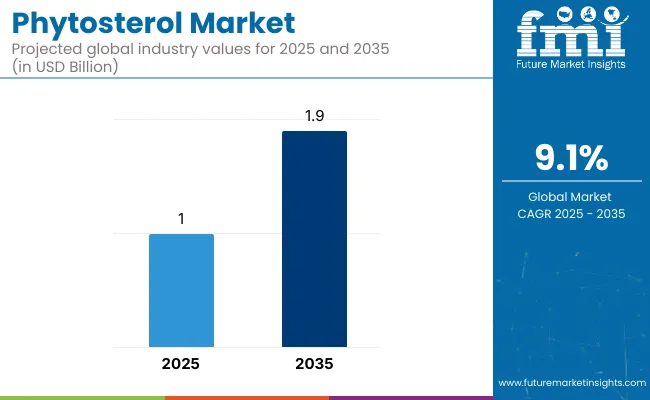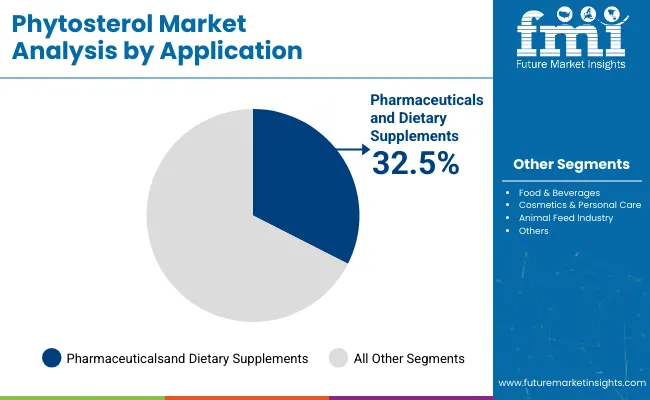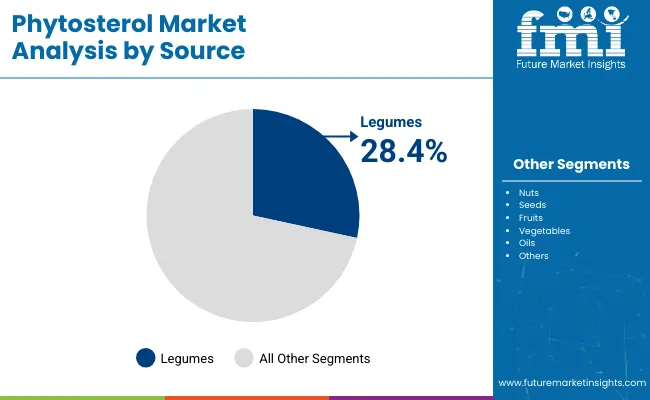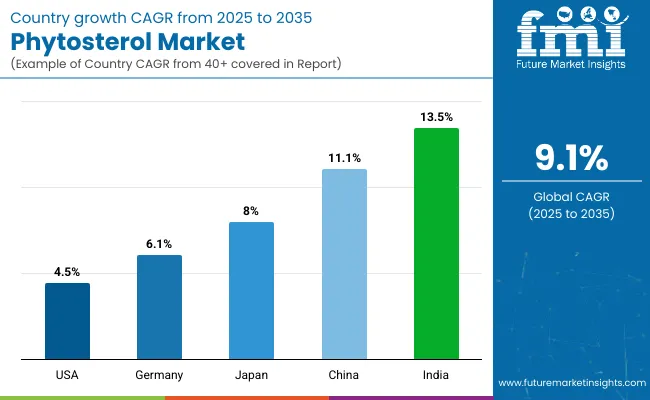The phytosterol market size was estimated at USD 0.92 billion in 2024. The phytosterol industry is expected to grow from USD 1 billion in 2025 to over USD 1.9 billion by 2035. The phytosterol market CAGR (growth rate) is expected to be around 9.1% during the forecast period (2025 to 2035).
Rising demand for functional foods and health-conscious consumer preferences are driving this growth. Phytosterols, found naturally in plant-based sources like legumes, nuts, and seeds, are being increasingly integrated into pharmaceuticals and dietary supplements due to their proven role in lowering LDL cholesterol and supporting metabolic health.

| Attribute | Detail |
|---|---|
| Industry Size (2025E) | USD 1 billion |
| Industry Value (2035F) | USD 1.9 billion |
| Value CAGR (2025 to 2035) | 9.1% |
Growing cardiovascular disease prevalence and interest in preventive nutrition are creating favorable conditions for phytosterol adoption. In 2025, pharmaceutical and dietary supplement applications are expected to dominate with a 32.5% market share.
This segment includes standalone sterol tablets, fortified soft gels, and cholesterol-lowering combination therapies. On the raw material side, legumes are projected to lead with a 28.4% share in 2025, driven by efficient extraction capabilities and abundant global production.
On June 23, 2025, The Economic Times reported findings from a global study presented at Nutrition 2025, which confirmed that phytosterol-rich diets-comprising nuts, whole grains, fruits, and legumes-correlate with improved insulin sensitivity, reduced systemic inflammation, and enhanced gut microbiota composition. The study concluded that incorporating phytosterols into daily intake can significantly reduce the risk of type 2 diabetes and heart disease.
This growing evidence base is boosting demand for clean-label phytosterol products across health-conscious demographics. Concurrently, regulatory bodies across North America and Europe have supported the safe use of phytosterols in functional foods.
Several FMCG brands are also launching yogurts, spreads, and juices with added sterols. With innovation in ingredient encapsulation and nanocarriers enhancing bioavailability, the phytosterol market is expected to remain resilient and innovation-driven through 2035
The table below shows a comparison of the changing CAGR between the base year, 2024, and the current year, 2025 for the global Phytosterol market. This examination discloses the main changes in how a market is working and shows revenue realization patterns which give stakeholders a better understanding of what this growth trajectory will be like for one year. The first half (H1) is from January through June while the second half (H2) comprises July through December.
| Particular | Value CAGR |
|---|---|
| H1 (2024 to 2033) | 8.7% |
| H2 (2024 to 2033) | 8.9% |
| H1 (2025 to 2034) | 9.0% |
| H2 (2025 to 2034) | 9.1% |
The above table shows the anticipated CAGR in the global Phytosterol market for a semi-annual interval between 2025 and 2035. The business is likely to grow at a CAGR of 8.7% in H1 2024, then the growth rate a little bit faster at 8.9% in H2 of the same year.
Moving into the year 2025, CAGR is expected to slightly increase to 9.0% in H1 and remain somewhat steady at 9.9% in H2.In the first half (H1 2025) there was a slight increase in BPS while during the second half (H2 2025), there was a rise in BPS.

Pharmaceutical and dietary supplements account for 32.5% of market value in 2025, with a projected CAGR of 7.6% through 2035. The increasing use of phytosterols in drug and nutritional supplements is attributed to its known health effects including cholesterol control and cardiovascular disease prevention. While further studies are conducted with the results indicating the effectiveness of phytosterols in lowering LDL cholesterol as well as enhancing overall cardiovascular health, the manufacturers of pharmaceutical products are gradually including plant sterols in their products.

Legumes are projected to lead with a market share of 28.4% in 2025. Legumes contain very little fat and a small glycemic index that helps improve weight loss and blood sugar regulation.
The phytosterol market is supported by shifting dietary habits, increased investment in functional foods, and rapid adoption across pharmaceutical and nutritional sectors. India, China, and the USA represent the highest growth markets with strong consumer demand for heart-healthy and plant-based ingredients.

| Countries | CAGR (%) |
|---|---|
| United States | 4.5% |
| Germany | 6.1% |
| Japan | 8.0% |
| China | 11.1% |
| India | 13.5% |
The USA phytosterol market is projected to grow at a CAGR of 4.5% through 2035. The market is driven by
Demand for phytosterol in Germany is expected to grow at a CAGR of 6.1% during the forecast period. Demand is driven by:
India is forecast to record a CAGR of 13.5% through 2035 in the phytosterol market. The growth is projected to be driven by:
The market is driven by rising demand for natural cholesterol-reducing compounds, supported by clean label trends and dietary shifts. Functional foods containing phytosterols are increasingly favored for their heart-health benefits.
Growing Demand for Plant-Based Products Driving Phytosterols Market Growth
The increasing consumption of plant-based products, fueled by the rise in vegetarianism, veganism, and the flexitarian diet, is driving the phytosterols market. Consumers are seeking products that not only offer nutritional benefits but also contribute to their health goals, such as lowering cholesterol and supporting heart health. Phytosterols are particularly valued for their cholesterol-blocking properties, as they compete with dietary cholesterol for absorption in the intestinal lining, making them a popular additive in foods like margarine, dairy products, and snacks.
Rise of Clean Labeling Boosting Phytosterol Use
The growing focus on clean labeling, with an emphasis on natural ingredients and transparent labeling, has further accelerated the use of phytosterols in food products. As consumers increasingly prefer plant-derived components, manufacturers have responded by incorporating phytosterols into their offerings, aligning with the rising demand for clean, recognizable ingredients.
The growing demand for functional foods and beverages that provide additional health benefits beyond basic nutrition is driving the phytosterol market. Phytosterols, known for their heart-health and cholesterol-lowering properties, are being incorporated into functional foods such as improved dairy products, plant-based milk, and snack bars. As consumer awareness of personal health increases, food products with added health benefits are becoming increasingly popular, boosting the consumption of phytosterols.
Increasing Demand for Phytosterols in Dietary Supplements
The rising popularity of dietary supplements, coupled with the accessibility provided by e-commerce platforms, has contributed to the growth of the phytosterol market. The demand for natural and organic products is also fueling this trend, as phytosterols are a natural, plant-based alternative to synthetic options.
Manufacturers are introducing various phytosterol-based supplements, including capsules, powders, and functional food forms, to cater to diverse consumer preferences. As more individuals recognize the health benefits of phytosterols, the market for phytosterol-containing supplements is expected to grow as part of the broader trend toward healthy living.
Growing demand for plant-based products is driving the market for phytosterols.
Increased the consumption of plant-based products including those associated with vegetarianism and veganism and a continuously rising number of people making use of the flexitarian diet. Customers are going for products not only with nutritional benefits but also active in optimizing their health objectives such as low cholesterol and extra heart health.
It has been used for its cholesterol-blocking property where it competes with dietary cholesterol for absorption by the intestinal lining a feature that has made it a safe enhancer for various food products such as margarine, dairy, and snacks.
The clean labialization, which has come to focus on the label information and natural ingredients, has also required the boost of the establishment of phytosterols. The living standards of people who are in focus when it comes to components are rising, and they prefer products containing components they know and are derived from plants.
This has led to the trend towards the introduction of phytosterols into the production of foods by the respective manufacturers and, therefore, increasing the number of products on the market.
The expansion of functional foods and beverages is a key driver for the phytosterols market.
Consumers demand food and beverages that have added healthy benefits in addition to just providing nutrients. Functional foods are foods that offer extra benefits beyond nutritional value brought about by prescriptive components and phytosterols are well known for cholesterol combating and cardiovascular benefits. Increasing awareness of personal health needs makes additive products, such as phytosterols, popular among consumers since food and beverages containing beneficial substances are preferred.
Incorporated into functional food and beverages including improved dairy products, plant-based milk, and snack bars. Indeed, the consumption demand is also anticipated to increase, since scientific research that generates support for health benefits linked with phytosterols is likely to continue.
The rising demand for phytosterol in dietary supplements Products
The increasing accessibility of e-commerce outlets and online health centers has contributed to greater access to dietary supplements by consumers. This has enhanced the accessibility of the phytosterol supplements hence enhancing the growth of the market by enabling those who desire to get the supplements to access them easily through purchase. Also, an increasing trend of natural and organically sourced products is in support of phytosterols, which a natural products as compared to synthetic varieties.
In order to meet this trend, manufacturers have launched different forms of phytosterol-based supplements such as capsules, powder, and functional food forms acceptable to different consumer bases. Since more and more individuals understand the importance of using phytosterols for health improvement, consumption of dietary supplements containing these compounds is likely to boost the phytosterols market as a part of the healthy lifestyle tendencies.
Some of the major players who operate in the Global Nutritional Ingredients market in the Phytosterol market are Archer Daniels Midland, Cargill Incorporated, BASF SE, Bunge Limited, and others. Many of these business leaders have a very large value share.
They are reputable manufacturing brands that also enjoy competitive and strategic over their rivals through a good production line, market, and distribution channel and also explore the market with new products. They have got their products all over the globe. This has several products of diversified spans considered with fashionable packaging types. So they pay more devotion to the standard legal objectives to build up more customer trust and enhance brand loyalty.
Some of the local key players include Herbo Nutra, Avanti Research, IPSUM Life Science LLP, and many others. The first of these strengths is that it focuses its attention on its local consumers and can address their needs and wants.
Regarding research and development, for instance, the regional players are slightly at a disadvantage when they are compared to the national brands; what will most probably come as a revelation to many observers is the fact that the regional players know their target consumers, and their market, very well indeed. Regional brands quickly adapt to the new conditions and needs of the consumer because it is small and in proximal to the regional market.
The phytosterol market is dominated by major players such as Bunge Limited, Cargill Inc., and BASF SE, recognized for their robust manufacturing capabilities, integrated supply chains, and strong presence in functional food and nutraceutical segments. Key players like Archer Daniels Midland Company, DuPont De Nemours, and Unilever Plc focus on product innovation, heart-health positioning, and regulatory compliance across global markets.
Emerging players including Arboris LLC, Gustav Parmentier GmbH, Pharmachem Laboratories Inc., and Raisio Plc serve niche applications by offering customized formulations for dietary supplements and fortified food categories. Market competitiveness is shaped by purity standards, bioavailability, and growing consumer demand for plant-based cholesterol-lowering ingredients.
Recent Phytosterol Industry News
By Product Type, the segment has been categorized into Campesterol, Beta-Sitosterol, Stigmasterol, and Others
Different forms include Nuts, Seeds, Fruits, Vegetables, Legumes, Oils, and Others.
There a different animal applications in Food & Beverages, Pharmaceuticals and Dietary Supplements, Cosmetics & Personal Care, the Animal Feed Industry, and Others
Industry analysis has been carried out in key countries of North America, Latin America, Western Europe, Eastern Europe, Balkans & Baltic, Russia & Belarus, Central Asia, East Asia, South Asia & Pacific, Middle East & Africa.
Estimated at USD 1 billion in 2025.
Bunge, Cargill, BASF, DuPont.
North America with 32.7% share.
Europe holds 18.3% share.






Our Research Products

The "Full Research Suite" delivers actionable market intel, deep dives on markets or technologies, so clients act faster, cut risk, and unlock growth.

The Leaderboard benchmarks and ranks top vendors, classifying them as Established Leaders, Leading Challengers, or Disruptors & Challengers.

Locates where complements amplify value and substitutes erode it, forecasting net impact by horizon

We deliver granular, decision-grade intel: market sizing, 5-year forecasts, pricing, adoption, usage, revenue, and operational KPIs—plus competitor tracking, regulation, and value chains—across 60 countries broadly.

Spot the shifts before they hit your P&L. We track inflection points, adoption curves, pricing moves, and ecosystem plays to show where demand is heading, why it is changing, and what to do next across high-growth markets and disruptive tech

Real-time reads of user behavior. We track shifting priorities, perceptions of today’s and next-gen services, and provider experience, then pace how fast tech moves from trial to adoption, blending buyer, consumer, and channel inputs with social signals (#WhySwitch, #UX).

Partner with our analyst team to build a custom report designed around your business priorities. From analysing market trends to assessing competitors or crafting bespoke datasets, we tailor insights to your needs.
Supplier Intelligence
Discovery & Profiling
Capacity & Footprint
Performance & Risk
Compliance & Governance
Commercial Readiness
Who Supplies Whom
Scorecards & Shortlists
Playbooks & Docs
Category Intelligence
Definition & Scope
Demand & Use Cases
Cost Drivers
Market Structure
Supply Chain Map
Trade & Policy
Operating Norms
Deliverables
Buyer Intelligence
Account Basics
Spend & Scope
Procurement Model
Vendor Requirements
Terms & Policies
Entry Strategy
Pain Points & Triggers
Outputs
Pricing Analysis
Benchmarks
Trends
Should-Cost
Indexation
Landed Cost
Commercial Terms
Deliverables
Brand Analysis
Positioning & Value Prop
Share & Presence
Customer Evidence
Go-to-Market
Digital & Reputation
Compliance & Trust
KPIs & Gaps
Outputs
Full Research Suite comprises of:
Market outlook & trends analysis
Interviews & case studies
Strategic recommendations
Vendor profiles & capabilities analysis
5-year forecasts
8 regions and 60+ country-level data splits
Market segment data splits
12 months of continuous data updates
DELIVERED AS:
PDF EXCEL ONLINE

Thank you!
You will receive an email from our Business Development Manager. Please be sure to check your SPAM/JUNK folder too.
Chat With
MaRIA